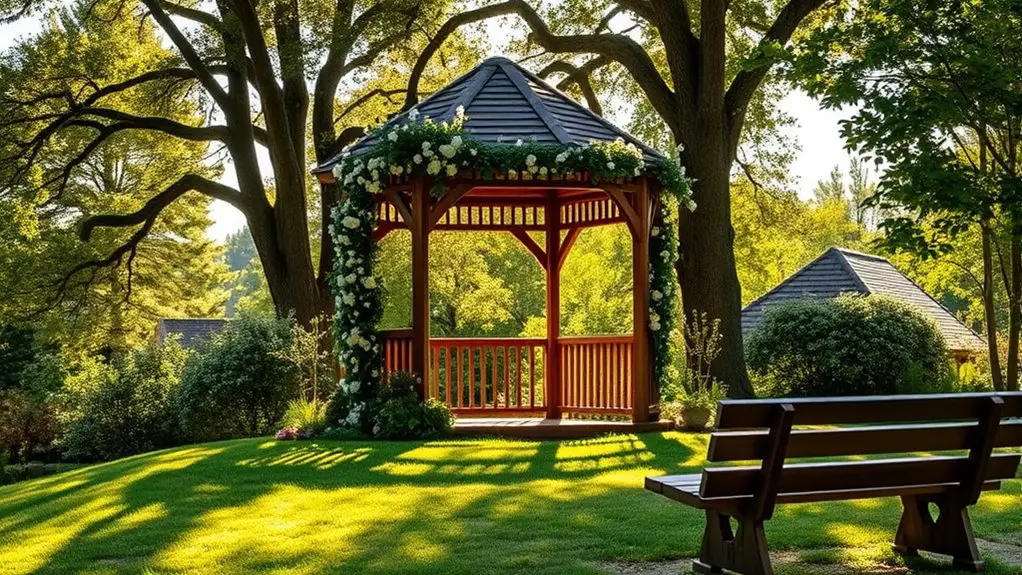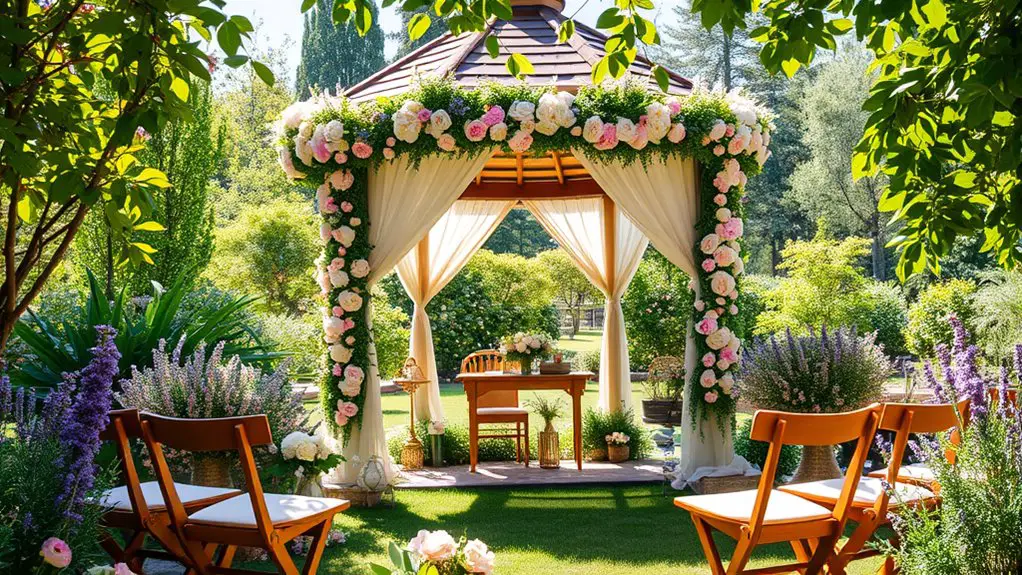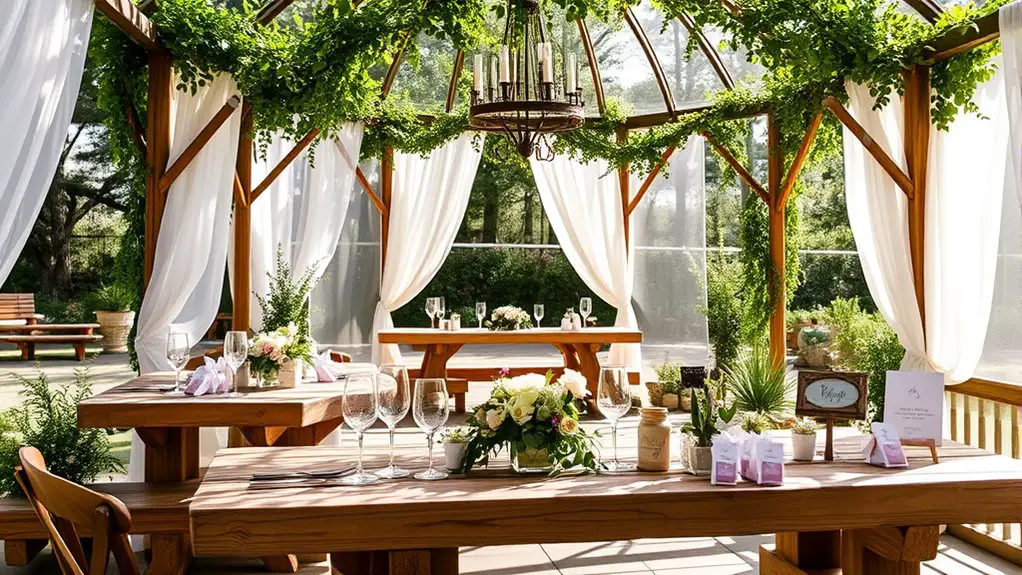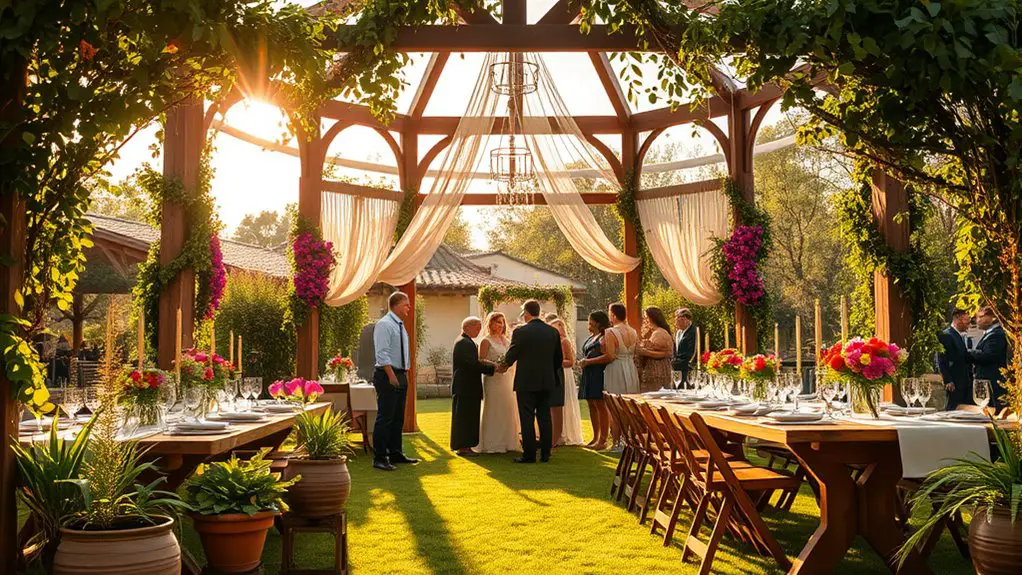To host a sustainable wedding in a gazebo, choose a scenic location that’s accessible for all guests and minimizes environmental disruption. Use eco-friendly invitations, and select reusable decor and local, seasonal flowers to support nearby growers. Opt for a plant-based menu with locally sourced ingredients while ensuring sustainable serving methods. Don’t forget to incorporate waste management practices, like recycling and composting stations, to reduce your event’s impact. There are more tips to enhance your celebration’s sustainability.
Choosing the Perfect Gazebo Location

When you’re selecting a gazebo location for your wedding, it’s vital to take into account both the aesthetic and environmental impact of your choice. Start by scouting areas that offer scenic views; a backdrop of lush greenery or a serene lake can elevate your ceremony. However, don’t just focus on beauty—accessibility considerations are significant. Make certain that your guests can easily reach the gazebo, especially those with mobility challenges.
Look for locations with nearby parking and pathways that accommodate everyone. Additionally, consider the environmental footprint of your chosen site. Opt for a location that minimizes disruption to local flora and fauna while enhancing the natural surroundings. You might also want to think about the time of year; seasonal changes can dramatically affect the look and feel of your venue. Choosing sheltered areas will help protect your guests from unexpected weather changes. Balancing aesthetics with accessibility and environmental impact will help you create a memorable and sustainable wedding experience.
Eco-Friendly Invitations and Stationery
When it comes to eco-friendly invitations and stationery, you’ve got several options to evaluate. Digital invitations eliminate paper waste entirely, while recycled paper choices and sustainable printing techniques can greatly reduce your environmental impact. By carefully selecting your stationery, you can set a responsible tone for your wedding right from the start.
Digital Invitation Options
Although traditional paper invitations have long been a wedding staple, opting for digital invitation options can greatly reduce your ecological footprint while still maintaining style and elegance. With various online platforms available, you can explore stunning digital designs that reflect your vision. These platforms offer customizable templates, allowing you to tailor your invitations to match your theme and personality effortlessly. Plus, sending invitations digitally eliminates the need for printing, postage, and waste, making it an eco-friendly choice. You can easily track RSVPs and communicate updates, ensuring a seamless planning process. Embracing digital invitations not only enhances convenience but also aligns with a sustainable lifestyle, giving you the freedom to celebrate your love while caring for the planet.
Recycled Paper Choices
Digital invitations are a fantastic way to reduce waste, but if you prefer the charm of traditional paper, recycled paper choices offer an eco-friendly alternative for your wedding stationery. You can choose from various recycled paper types, such as post-consumer waste, agricultural residue, or cotton fiber, each providing a unique texture and appearance. These options not only look beautiful but also greatly lessen your environmental impact. When selecting your stationery, make sure you work with a vendor who specializes in eco-friendly printing methods, which use soy or vegetable-based inks and water-based coatings. Opting for recycled paper and eco-friendly printing aligns your wedding with sustainable values, allowing you to celebrate love while protecting the planet.
Sustainable Printing Techniques
Choosing eco-friendly printing techniques is essential for creating sustainable wedding invitations and stationery. You’ll want to contemplate the following options to minimize your environmental impact:
- Sustainable Inks: Opt for vegetable-based or soy-based inks that are less harmful to the environment than traditional petroleum-based options.
- Eco-Friendly Printers: Seek out local printers that prioritize sustainability in their operations, using energy-efficient practices.
- Digital Printing: This technique often uses less waste and can be more environmentally friendly for smaller runs.
- Plantable Paper: Choose stationery made from seed paper, allowing guests to plant their invitation and enjoy flowers later.
Sustainable Decor Ideas for Your Gazebo
When planning your gazebo decor, consider opting for eco-friendly floral arrangements that not only reduce waste but also enhance your natural surroundings. Incorporating reusable decor elements, like fabric banners or repurposed centerpieces, can add a personal touch while minimizing environmental impact. By making these choices, you’ll create a beautiful setting that aligns with your sustainable wedding goals. Additionally, using outdoor fabric options for your decor can ensure durability and weather resistance while maintaining an eco-conscious approach.
Eco-Friendly Floral Arrangements
While planning your wedding, it’s essential to contemplate how eco-friendly floral arrangements can enhance the beauty of your gazebo without harming the planet. By focusing on sustainable sourcing and floral recycling, you can create stunning displays that reflect your values. Consider these ideas:
- Local Blooms: Choose flowers from local growers to reduce carbon footprints.
- Seasonal Selections: Opt for seasonal flowers that thrive in your area, ensuring freshness and lower environmental impact.
- Potted Plants: Use potted arrangements that guests can take home, promoting floral recycling and reducing waste.
- Dried Flowers: Incorporate dried arrangements for a timeless, low-maintenance option that can be reused or repurposed post-wedding.
Each choice contributes to a beautiful, sustainable celebration in your gazebo.
Reusable Decor Elements
Incorporating reusable decor elements into your gazebo can greatly enhance the sustainability of your wedding. Consider using upcycled centerpieces made from materials like glass jars or wooden crates, which not only reduce waste but also add a personal touch. You might also opt for sustainable lighting options, such as solar-powered fairy lights or LED candles, to create a warm ambiance without the environmental impact of traditional lighting. By choosing decor that can be reused or repurposed after the event, you’re minimizing waste and promoting a more eco-friendly celebration. Don’t forget to encourage your guests to contribute any decor items they might have, fostering a sense of community while enhancing the sustainability of your special day.
Selecting Local and Seasonal Flowers

Choosing local and seasonal flowers not only enhances your wedding’s aesthetic but also supports sustainable practices and reduces your carbon footprint. By selecting blooms that thrive in your area during your wedding season, you can enjoy vibrant arrangements while benefiting the environment. Here are four tips to help you choose the best flowers:
- Research Flower Types: Look into native blooms like peonies or sunflowers, which are often more resilient and beautiful.
- Check Seasonal Availability: Consult a local florist or online resources to see what’s in season when you’re tying the knot.
- Visit Local Farms: Support your community by sourcing flowers directly from local growers—this often guarantees freshness.
- Consider Color Palettes: Local flowers can guide your color scheme, allowing for a cohesive and natural look that reflects your surroundings.
Embracing local and seasonal flowers can truly elevate your special day!
Green Catering Options for Your Reception
When planning your wedding reception, considering green catering options can greatly reduce your environmental impact. Opting for locally sourced ingredients not only supports nearby farmers but also cuts down on transportation emissions. Additionally, incorporating plant-based menu options and eco-friendly serving practices can enhance your celebration while aligning with sustainable values.
Locally Sourced Ingredients
As you plan your wedding reception, opting for locally sourced ingredients not only enhances the flavor of your meals but also supports regional farmers and reduces your event’s carbon footprint. Embracing farm to table options means you’ll showcase the best of seasonal produce, creating a menu that reflects the time of year and your commitment to sustainability. Here are four ideas to evaluate:
- Seasonal salads featuring greens and vegetables from nearby farms.
- Locally sourced meats or seafood that celebrate regional flavors.
- Artisanal cheeses from local dairies, adding a unique touch to your charcuterie board.
- Desserts made with local fruits, ensuring freshness and supporting local orchards.
Plant-Based Menu Options
Incorporating plant-based menu options into your wedding reception not only aligns with sustainable practices but also caters to a growing number of guests who prefer or need vegetarian and vegan choices. Start with a vibrant salad featuring seasonal vegetables, showcasing the freshness of local produce. For the main course, consider a hearty grain bowl or stuffed peppers that highlight the flavors of the season. Don’t forget about plant-based desserts; a decadent chocolate mousse made with avocado or a fruit tart can satisfy even the most discerning sweet tooth. By offering these options, you’re not just accommodating dietary restrictions—you’re embracing a culinary trend that celebrates health and sustainability. Your guests will appreciate the thoughtfulness behind each dish.
Eco-Friendly Serving Practices
While catering can often contribute to waste and environmental impact, implementing eco-friendly serving practices can greatly reduce your wedding’s carbon footprint. Here are some practical options to contemplate:
- Sustainable Tableware Options: Choose plates and cups made from bamboo or recycled materials that are both stylish and biodegradable.
- Compostable Serving Utensils: Replace plastic with compostable utensils that break down naturally after use, reducing landfill waste.
- Bulk Beverage Stations: Opt for large dispensers instead of individual bottles to minimize packaging waste.
- Edible Serving Containers: Contemplate serving appetizers in edible cups made from vegetables or grains, adding a unique flair and eliminating waste.
Ethical Attire for the Bride and Groom
Choosing ethical attire for the bride and groom not only reflects personal values but also contributes to environmental sustainability and social responsibility. When selecting your wedding outfits, consider sustainable fashion options that prioritize ethical sourcing. Look for designers who use eco-friendly materials, such as organic cotton, hemp, or recycled fabrics.
You might also explore second-hand shops or vintage boutiques, which can offer unique styles while reducing waste. Custom-made attire from local artisans can guarantee fair labor practices and minimize your carbon footprint.
Don’t forget about accessories—consider biodegradable or ethically-sourced jewelry and shoes. By choosing outfits that align with your values, you not only enhance your personal style but also make a positive impact on the planet. This approach not only celebrates your love story but also champions a brighter future for all, allowing you to express your freedom and individuality on your special day.
Eco-Conscious Wedding Favors

When planning your wedding, consider that the small details, like wedding favors, can greatly impact your guests’ experience and the environment. Choosing eco-conscious wedding favors not only aligns with your values but also leaves a lasting impression. Here are some ideas that embrace sustainable packaging and personalization:
- Seed packets: Give each guest a packet of native wildflower seeds. They’re eco-friendly and can be personalized with a special message.
- Reusable bags: Custom tote bags made from organic cotton can serve as practical favors, reducing plastic waste.
- Local honey jars: Provide small jars of local honey, wrapped in sustainable packaging. It’s a sweet treat that supports local beekeepers.
- Handmade soaps: Opt for artisanal soaps packaged in recyclable materials. They can be personalized with scents that reflect your wedding theme.
Responsible Transportation for Guests
As you plan your sustainable wedding, considering responsible transportation for your guests can greatly reduce your event’s carbon footprint. Encourage carpool options by creating a group chat or online platform where guests can coordinate rides. This not only minimizes the number of vehicles but also fosters camaraderie among your friends and family.
Additionally, think about hiring shuttle services to transport guests from central locations to your venue. This can considerably cut down on emissions and make logistics easier for everyone. Providing shuttles guarantees that guests arrive together, reducing parking congestion and enhancing the overall experience.
Lastly, share public transportation routes and options in your invitations. By offering multiple sustainable transportation methods, you’re empowering your guests to make eco-friendly choices. This approach not only reflects your commitment to sustainability but also inspires your loved ones to embrace greener habits in their own lives.
Incorporating Nature Into Your Ceremony
Incorporating nature into your ceremony not only enhances the aesthetic but also deepens the connection between your celebration and the environment. By embracing natural elements, you can create an outdoor ambiance that feels harmonious and inviting. Here are four practical ideas to take into account:
- Floral Arches: Use locally sourced blooms to create stunning arches that frame your vows.
- Natural Seating: Opt for wooden benches or hay bales for seating, blending comfort with rustic charm.
- Live Music: Incorporate acoustic musicians to complement the sounds of nature, enhancing the atmosphere.
- Eco-Friendly Decor: Utilize biodegradable materials like bamboo or recycled paper for any signage or programs.
Additionally, consider incorporating seasonal blooms to ensure your floral arrangements complement the natural surroundings throughout the year. These elements not only reflect your values but also allow your guests to feel the freedom and beauty of the natural world around them. By thoughtfully incorporating nature, your ceremony can truly resonate with your commitment to sustainability.
Waste Management and Recycling Practices
Creating a sustainable wedding goes beyond just a beautiful ceremony; it also involves being mindful of waste management and recycling practices throughout your event. You can markedly minimize your impact by incorporating waste sorting, recycling bins, and composting stations into your setup.
Here’s a practical guide to help you visualize the process:
| Type of Waste | Action | Bin/Station |
|---|---|---|
| Food Scraps | Composting | Composting Stations |
| Plastic & Glass | Recycling | Recycling Bins |
| Paper & Cardboard | Recycling | Recycling Bins |
| Non-Recyclables | Landfill | Regular Trash Bin |
Frequently Asked Questions
How Can I Reduce Plastic Use at My Wedding?
To reduce plastic use at your wedding, consider biodegradable decor and reusable tableware. These choices not only minimize waste but also reflect a commitment to sustainability, allowing you to celebrate freely while caring for the environment.
What Are Some Eco-Friendly Alternatives to Traditional Wedding Rings?
For eco-friendly wedding rings, consider sustainable materials like recycled metals and lab-grown gems. These options reduce environmental impact while offering unique styles, letting you express your love without compromising on ethical values.
How Can We Involve Guests in Sustainability Efforts?
Imagine your guests wearing eco-friendly wristbands, each representing a sustainability pledge. By offering wedding favors that support local artisans or sharing recycling tips, you’ll encourage guest involvement and inspire collective efforts for a greener future.
What Are the Benefits of a Weekday Wedding for Sustainability?
A weekday wedding offers weekday advantages like lower venue availability costs and reduced resource consumption. You’ll find it easier to book eco-friendly venues, leading to a more sustainable celebration while enjoying greater flexibility in planning.
How Can I Offset the Carbon Footprint of My Wedding?
Imagine a lush forest where your wedding blooms harmoniously. To offset your wedding’s carbon footprint, explore carbon offsetting options like tree planting, and encourage sustainable transportation choices, ensuring love thrives alongside nature’s beauty.

